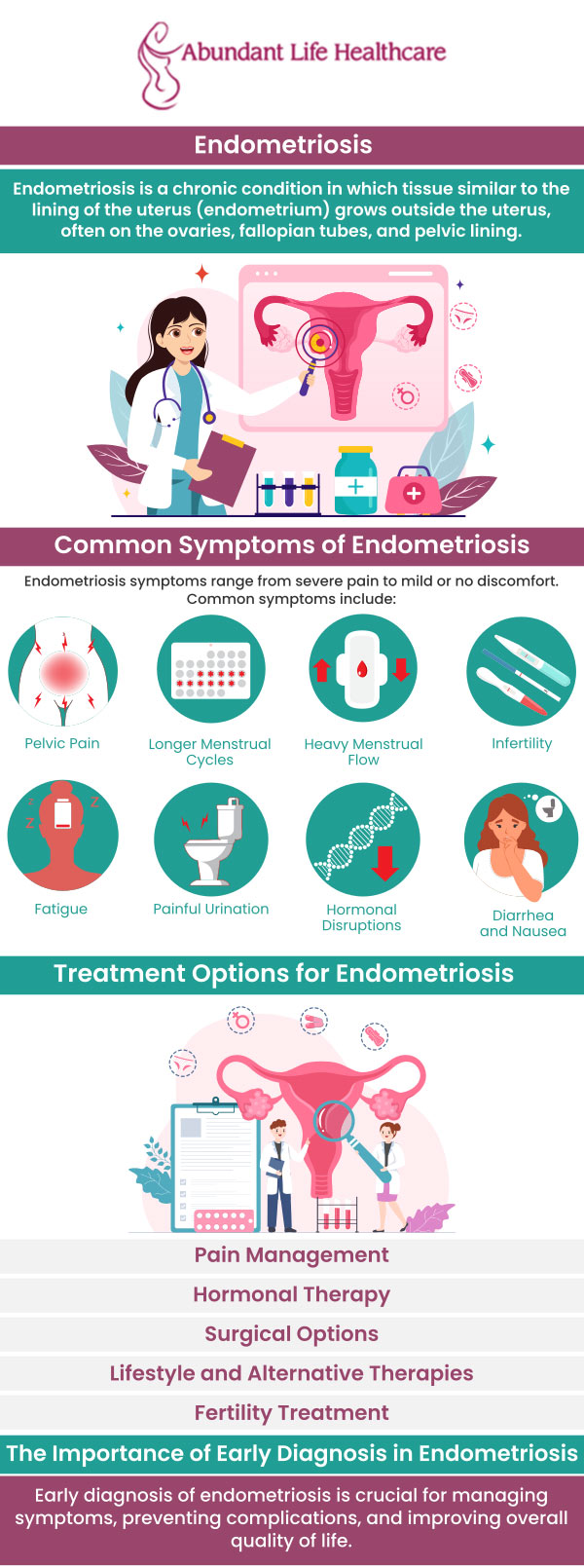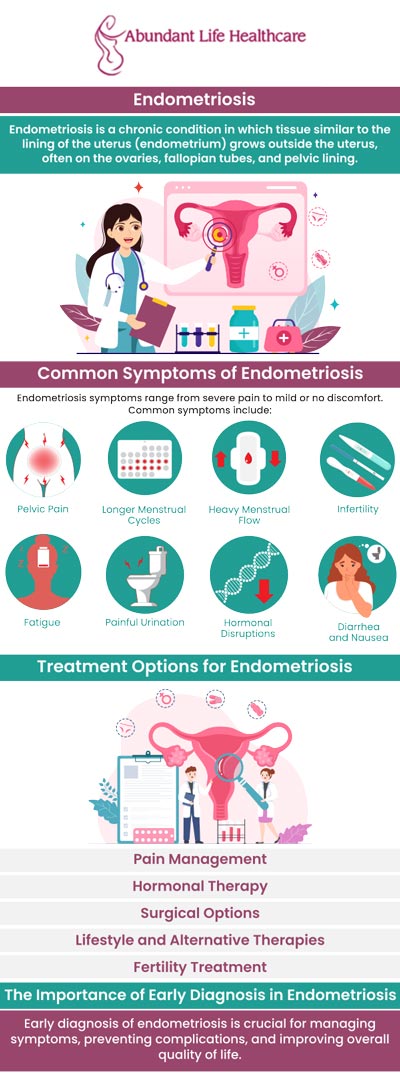What Is Endometriosis? Symptoms and Causes
Endometriosis is a chronic condition characterized by tissue similar to the uterine lining growing in areas outside the uterus, which causes pain and inflammation. This displaced tissue acts like the uterine lining by thickening and bleeding, but has no way to exit the body. The primary symptoms include severe pelvic pain, especially during periods, and can also lead to heavy bleeding, pain with intercourse, and infertility. Visit Dr. Marc Jean-Gilles, DO, FACOG, to create a personalized treatment plan at Abundant Life Healthcare. For more information, contact us today or book an appointment online. We are conveniently located at 601A Professional Drive, Suite 370, Lawrenceville, GA 30046.


Table of Contents:
What is the main cause of endometriosis?
How do I confirm if I have endometriosis?
What age does endometriosis start?
What’s the difference between PCOS and endometriosis?
Endometriosis occurs when tissue similar to the lining inside the uterus (the endometrium) grows outside the uterus, often causing pain, irregular bleeding, and sometimes fertility challenges. While the exact cause of endometriosis remains unclear, the most widely accepted theory is retrograde menstruation. This means that during a menstrual cycle, some menstrual blood flows backward through the fallopian tubes into the pelvic cavity, allowing endometrial cells to attach to pelvic organs where they can continue to grow and react to hormonal changes.
However, endometriosis is a complex condition, and retrograde menstruation is only one piece of the puzzle. At Abundant Life Healthcare, we recognize that additional factors—including genetics, immune system function, hormonal imbalances, and even surgical scar tissue—may contribute to the development of endometriosis. Not every woman who experiences retrograde menstruation develops endometriosis, which suggests a combination of genetic, environmental, and immunological influences are involved.
Our team stays abreast of the latest research to offer our patients the best possible care. We are dedicated to helping you understand your symptoms, providing accurate diagnoses, and developing personalized treatment plans to manage endometriosis and support your overall health. If you are experiencing symptoms such as pelvic pain, heavy periods, or difficulty getting pregnant, we can work toward a healthier, more abundant life.
At Abundant Life Healthcare, we understand how disruptive and distressing pelvic pain and related symptoms can be. If you are experiencing persistent pelvic pain, especially during menstruation, pain with intercourse, excessive menstrual bleeding, or difficulty with fertility, these could be signs of endometriosis. Our compassionate team is here to help you find answers and relief.
Our approach to diagnosing endometriosis involves a thorough evaluation of your symptoms and medical history, followed by targeted diagnostic procedures. When you visit us, our provider will start by discussing your symptoms in detail and performing a gentle pelvic exam to check for any abnormalities, such as cysts or scarring behind the uterus.
We may also recommend imaging tests, such as ultrasound or MRI, to identify larger lesions or ovarian cysts (endometriomas). While these scans can provide valuable information, they may not detect smaller areas of endometriosis. For a definitive diagnosis, our providers may discuss the option of a minimally invasive procedure called laparoscopy. This procedure allows us to directly visualize potential endometrial tissue outside the uterus and, if necessary, take a small tissue sample (biopsy) for confirmation.
Although blood tests and laboratory work are not typically reliable for diagnosing endometriosis, we may use them to rule out other possible causes of your symptoms.
If you suspect you may have endometriosis, early evaluation is key to finding relief and protecting your long-term health. At Abundant Life Healthcare, our goal is to provide you with expert guidance, personalized care, and a clear path forward.
Endometriosis can begin as soon as a young woman starts having menstrual periods, though it is most often diagnosed in women between their 20s and 40s. Endometriosis typically begins after menstruation, usually between the ages of 11 and 14. Symptoms such as pelvic pain, heavy periods, or pain during intercourse may emerge in the teenage years, but it’s also common for symptoms to be subtle or delayed, sometimes not appearing until later in life, especially when fertility challenges arise.
At Abundant Life Healthcare, we are committed to early recognition and comprehensive evaluation of endometriosis. Early diagnosis and management are key to reducing the impact of endometriosis on your daily life and well-being.
PCOS is a condition in which higher levels of androgens (male hormones) are produced ovaries than normal. This imbalance can disrupt ovulation, resulting in irregular menstrual cycles and sometimes difficulty conceiving. Common symptoms include:
• Irregular or missed periods
• Weight gain or difficulty losing weight
• Acne or oily skin
• Thinning hair on the scalp
PCOS is also linked to insulin resistance, increasing the risk for type 2 diabetes and other metabolic challenges. At Abundant Life Healthcare, our providers offer personalized evaluation and management plans for PCOS, focusing on lifestyle changes, hormonal therapies, and ongoing support to help you achieve optimal health.
Endometriosis often affects the ovaries, fallopian tubes, and surrounding pelvic organs. Unlike PCOS, endometriosis is not a hormonal disorder, but hormones can influence its symptoms. The hallmark of endometriosis is chronic pelvic pain, especially during menstruation. Other symptoms include:
• Heavy or irregular periods
• Ongoing fatigue
• Difficulty getting pregnant
At Abundant Life Healthcare, our team utilizes advanced diagnostic tools and compassionate care to help women with endometriosis find relief. Treatment options may include medication, minimally invasive procedures, or coordinated fertility support, tailored to your individual needs and life goals.
Although both PCOS and endometriosis can affect fertility and quality of life, their underlying mechanisms and symptoms are distinct, requiring different diagnostic and management approaches. If you are experiencing menstrual irregularities, pelvic pain, or concerns about fertility, our experienced providers at Abundant Life Healthcare are here to listen, support, and guide you to the most effective solutions. For more information, contact us today or book an appointment online. We are conveniently located at 601A Professional Drive, Suite 370, Lawrenceville, GA 30046. We serve patients from Lawrenceville GA, Suwanee GA, Snellville GA, Duluth GA, Dacula GA, Lilburn GA, Loganville GA, Auburn GA, and surrounding areas.
Check Out Our 5 Star Reviews


Additional Services You May Like

Additional Services You May Like
- Obstetrics
- Pregnancy
- Gynecologist
- Birth Control
- Labiaplasty
- Microblading
- Weight Loss
- Semaglutide GLP-1
- Pap Smears
- Pelvic Pain
- Laser Hair Removal
- In House Ultrasound (Including 3D)
- Vaginal Birth After C-Section (VBAC)
- Pregnancy As High Risk
- Multiple Gestations
- Postpartum Counseling
- 24hour/365days On Call Service
- Annual Exam
- Abnormal Uterine Bleeding
- Management Of Endometriosis
- Ultrasound
- Pelvic Organ Prolapse
- Urinary Incontinence
- Perimenopause And Menopause
- Sexual Dysfunction
- Fat Freeze (Like Cool Sculpting)
- Body Contouring
- Ozempic
- Civil Surgeon
- Hormone Replacement Therapy
- Immigration Medicine
- Biote Hormone Pellets
- GLP-1
- Peptide Therapy




